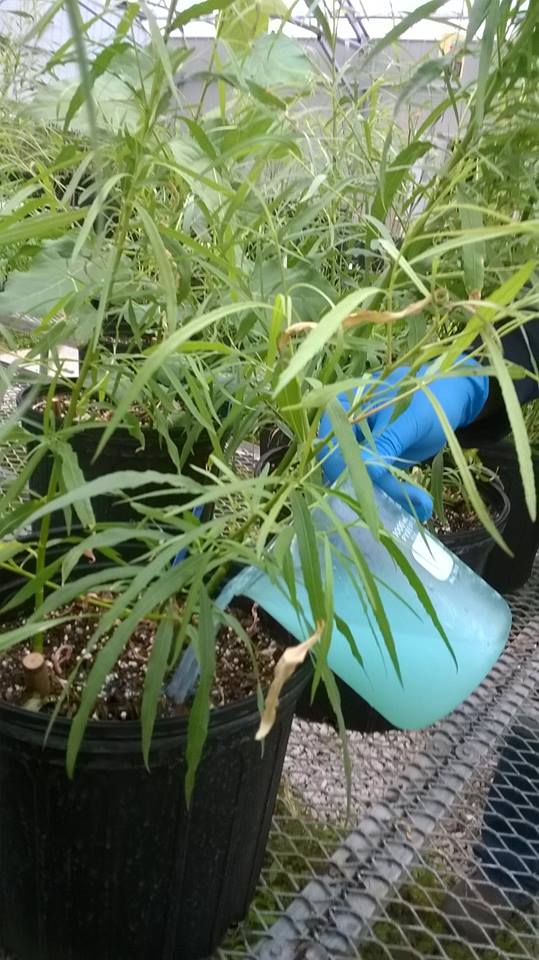Impact of storm water runoff on tree roots, physiology and rhizosphere microbial diversity in urban forests
2012 | Sougata Bardhan, University of Missouri Columbia
Urban forests are a critical component of modern infrastructure for maintaining natural environment, providing recreational areas, and reducing pollution. Social and medical benefits provided by urban forests in reducing stress of city life and renewing vital energy have been well documented. However urban forestry is challenged by poor soil quality, deficiency of nutrients, and widespread pollution. To sustain urban forests and their numerous benefits, creative and innovative approaches to reduce the stress level to urban forests are necessary. Storm water runoff into urban forests carries large amounts of pollutants that include heavy metals, oils, pesticides, and poly aromatic hydrocarbons (PAHs). Plant growth and physiological functions such as root and shoot length, and photosynthetic efficiency can be negatively affected by these pollutants. Several pollutants can also alter the microbial communities in a particular ecosystem. Shift in microbial communities can result in improper nutrient cycling and decline in primary production. Therefore detailed investigation of storm water impacts on urban forests will be beneficial in developing natural and cost-effective management strategies to tackle the effects of storm water runoff. We propose to identify the impact of storm water runoff and the resulting pollution on urban forest ecosystems. We will accomplish this by measuring pollutants in soil, plant roots and shoots growth, physiological functions such as leaf gas exchange, photosynthetic efficiency, chlorophyll content and shift in microbial communities. The results from this study will be valuable in determining the source and extent of pollution because of storm water runoff. The knowledge gained from this study can be utilized to develop proper management strategies for storm water runoff in the urban ecosystem.
Study Results
 Storm water runoff in urban forests can carry heavy metals and other xenobiotic compounds that can influence plant growth and at the same time change the soil microbial population. To better understand the impacts of storm water pollutants, we conducted a greenhouse experiment where we artificially polluted four different species of plants with heavy metals and other compounds. We quantified the heavy metals in the potting media and plant tissue and observed differential uptake and mobility in the soil samples. The impact of other xenobiotic compounds was indirectly measured through photosynthesis potential and conductance measurements. No trend was observed in the plant physiological functions due to the different rate of pollutants. Microbial diversity and community composition also did not seem to be influenced by the pollutants after two weeks of exposure. Based on the results of this study, it appears that a two week exposure to the pollutants used in this study is not detrimental to the plant in the short term. However, long term implications on plant physiology and function needs to be monitored to gain a better understanding of the impact of storm water pollutants on urban forests.
Storm water runoff in urban forests can carry heavy metals and other xenobiotic compounds that can influence plant growth and at the same time change the soil microbial population. To better understand the impacts of storm water pollutants, we conducted a greenhouse experiment where we artificially polluted four different species of plants with heavy metals and other compounds. We quantified the heavy metals in the potting media and plant tissue and observed differential uptake and mobility in the soil samples. The impact of other xenobiotic compounds was indirectly measured through photosynthesis potential and conductance measurements. No trend was observed in the plant physiological functions due to the different rate of pollutants. Microbial diversity and community composition also did not seem to be influenced by the pollutants after two weeks of exposure. Based on the results of this study, it appears that a two week exposure to the pollutants used in this study is not detrimental to the plant in the short term. However, long term implications on plant physiology and function needs to be monitored to gain a better understanding of the impact of storm water pollutants on urban forests.
Year: 2012
Funding Duration: 1-3 years
Grant Program: Jack Kimmel International
Grant Title: Impact of storm water runoff on tree roots, physiology and rhizosphere microbial diversity in urban forests
Researcher: Sougata Bardhan
Key words:
Peer Reviewed Publications from Grant:
General Audience/Trade Publications:
Presentations:
- Bardhan, S and S. Jose. Impact of Storm Water Runoff on Tree Roots, Physiology and Rhizosphere Microbial Diversity in Urban Forests. ASA-CSSA-SSSA International Annual Meeting, Nov 2 – 5, Long Beach, CA.
- Bardhan, S and S. Jose. Growth of Trees and Grasses Exposed to Storm Water Runoff and it’s impact on roots and microbial ecology in Urban Forests. Agroforestry Symposium, University of Missouri – Columbia, Jan 8, 2015, Columbia, MO.
For more information on this project, contact the researcher via TREE Fund at treefund@treefund.org.
